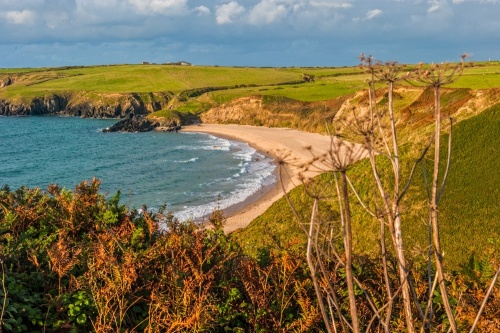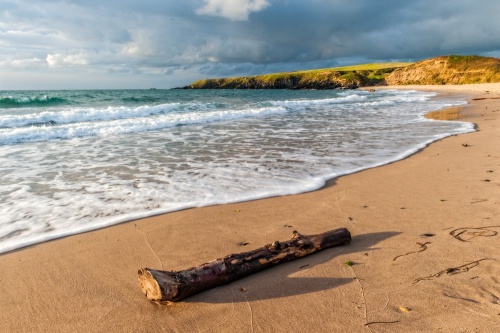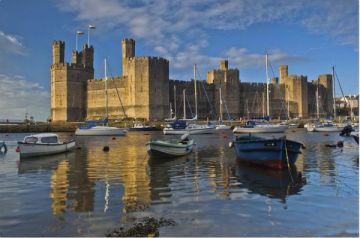
The National Trust owns one of the finest beaches in Wales at Porth Oer, in the south-west corner of the scenic Lleyn peninsula in north-west Wales. This delightful secluded beach is set in a small bay and protected from the elements by high grassy cliffs. The National Trust calls Port Oer 'one of our most perfect beaches in Wales', and you can easily see why.
The Whistling Sands
The beach at Porth Oer gained the popular nickname of The Whistling Sands due to the peculiar high-pitched squeal, or whistling noise when you walk across the sand. The sand particles rub together in a way that produces an unusual noise.
Many online sources of information claim that this 'whistling' phenomenon is only found on one other beach in Europe, but this is incorrect. I know of at least one other place in Britain - a beach near Port Ellen on Islay in Scotland - that boasts a similar phenomenon. It does take a bit of imagination to hear a whistling noise but there's definitely an unusual sound!

The science behind the whistling phenomenon is fascinating - though not fully understood. It seems that the sand grains have to be between 0.1 and 0.5 mm, very spherical in shape and contain quartz and silica. The sand also has to be at a very specific level of humidity.
The sound is more common when the sand is dry. Try stamping or sliding your feet along the surface of the sand just above the high tide mark to produce the noise. It sometimes appears that the direction and velocity of the wind makes a difference to the noise.
There are large rocks along the beach which can create tidepools if the tide is out, and the beach itself is simply stunning, with crystal clear water and clean white sand. Not surprisingly this is a popular spot for family picnics.
This is a popular area for water sports such as surfing, bodyboarding, diving and sailing, but even if you don't want to get wet you can still enjoy the excellent Wales Coast Path which runs past Porth Oer and gives wonderful views along the coast. South along the coast you will find sea caves while further inland is a ruined lookout tower atop Mynydd Carreg.

I visited Porth Oer several times during a wonderful week I spent at a holiday cottage near Porthmadog. The beach is wonderful and the sunsets, as I can attest, are breathtaking. You can frequently spot seals offshore and the occasional dolphin, plus a large population of seabirds like shags and cormorants.
You wouldn't know it to see Porth Oer today but this quiet bay used to be a busy port, with ships docking to unload lime and coal and to load local farm produce such as eggs, cheese, poultry and butter. A reminder of local industry comes in the form of an old lime kiln on the coastal path to the north of the beach.
As of our latest visit dogs are not allowed on the beach during the summer months.
Getting There
Porth Oer is very easy to reach via the minor road between Aberdaron and Rhydlios. There is a National Trust parking area roughly 180m (590 feet) from the beach. There is a seasonal cafe/shop and toilets on the beach itself.
About Porth Oer (Whistling Sands)
Address: Aberdaron,
Lleyn Peninsula,
Gwynedd,
Wales
Attraction Type: Countryside
Location: On a minor road between Aberdaron and Rhydlios
Website: Porth Oer (Whistling Sands)
National Trust
Location map
OS: SH165298
Photo Credit: David Ross and Britain Express
HERITAGE
 We've 'tagged' this attraction information to help you find related historic attractions and learn more about major time periods mentioned.
We've 'tagged' this attraction information to help you find related historic attractions and learn more about major time periods mentioned.
Find other attractions tagged with:
NEARBY HISTORIC ATTRACTIONS
Heritage Rated from 1- 5 (low to exceptional) on historic interest
Aberdaron, St Hywyn's Church - 2.2 miles (Historic Church) ![]()
Llanfaelrhys, St Maelrhys Church - 3.3 miles (Historic Church) ![]()
Plas-yn-Rhiw - 4.5 miles (Historic House) ![]()
Castell Carn Fadrun - 7.7 miles (Castle) ![]()
Llanengan, St Engan's Church - 8.2 miles (Historic Church) ![]()
Tre'r Ceiri Hillfort - 15.4 miles (Prehistoric Site) ![]()
Penarth Fawr - 16.4 miles (Historic House) ![]()
St Cybi's Well - 17.7 miles (Historic Church) ![]()
Nearest Holiday Cottages to Porth Oer (Whistling Sands):
More self catering near Porth Oer (Whistling Sands)



